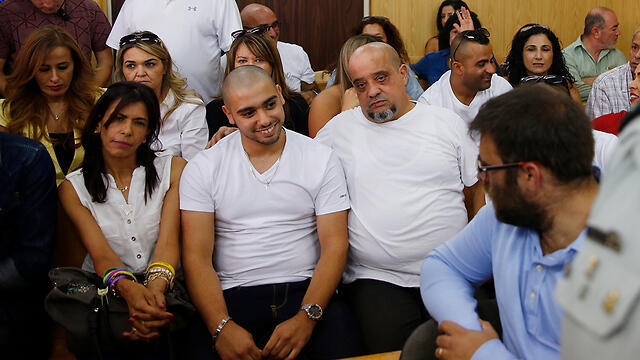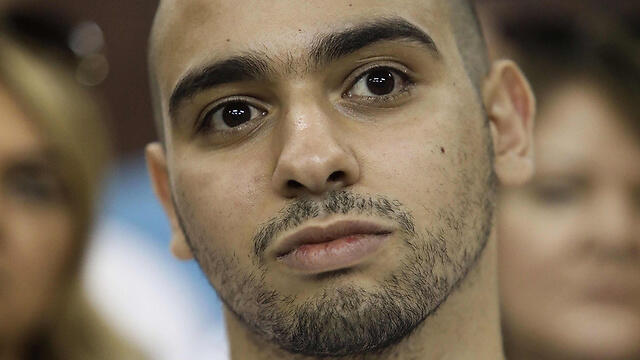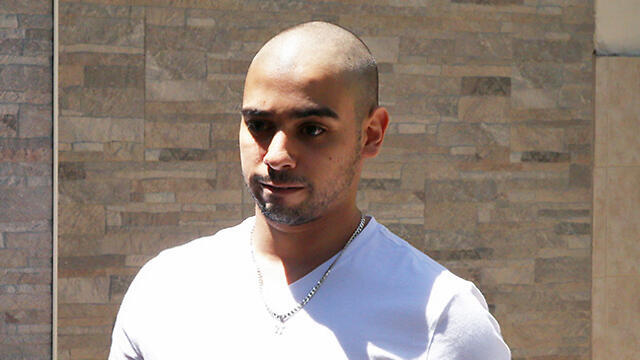Getting your Trinity Audio player ready...
The Military Court of Appeals rejected Sunday both appeals in the Elor Azaria trial, upholding the manslaughter conviction and18-month sentence given to the former soldier who shot dead a neutralized Palestinian terrorist during his IDF service in Hebron.
Azaria, who appeared in court for the first time as a civilian after having been released from the IDF on July 20 ,had appealed his manslaughter conviction .
His defense team raised questions regarding the credibility of the testimonies of company commander Maj. Tom Na'aman and the soldier Cpl. T.—who both testified they heard Azaria say that he shot the terrorist because "he deserved to die after stabbing my friend." In addition, Azaria's team claimed soldiers and police officers in similar cases in the past were not prosecuted.
Meanwhile the military prosecution appealed Azaria's sentence of 18 months ,which it says is too lenient. It demanded the court to instead adopt the minority opinion and add six months to Azaria's sentence, bringing it to a total of two years.
Military Appeals Court President Maj. Gen. Doron Piles rejected the defense team's argument of selective enforcement against Azaria over claims similar incidents in the past did not go to trial, saying "The defense failed in proving this claim. The three cases presented by the defense, including the case of Col. Israel Shomer ,are not similar to our case."
The court also rejected the claims the testimony of Cpl. T. was not credible, saying there was "no practical relevance to the appellant's claims that T.'s testimony was engineered by the IDF Criminal Investigation Division (CID)... T. confirmed his testimony to the CID in his testimony in court. We found no fault in the conclusion of the district court that found T.'s testimony to be credible. We do not accept Azaria's assertion that T. fabricated his testimony to match the positions of the IDF chief. There is no proof to the defense attorney's claim that words were put in T.'s mouth. He repeated his version over and over again of his own accord."
Furthermore, Piles said the court found that none of the witnesses "had a motive to falsely accuse Azaria."
3 View gallery


Azaria and his family talking to Likud MK Oren Hazan (Photo: Tomer Applebaum)
(צילום: תומר אפלבאום)
The Military Appeals Court did find the testimony of company commander Na'aman to be problematic, saying he "gave completely different versions (to the CID and to the court). His explanations raise questions, some of his remarks are meaningless and unclear." Despite that, the appeals court decided not to intervene in the dispute over the company commander's testimony.
Instead, the court pointed to Azaria's version, which it found to be "not credible," as well as "suppressed and adaptive and could not be trusted."
Azaria, Piles said, "refused to participate in a confrontation with the witnesses" and "tried to shape his version in accordance with the information he received."
The appeals court reaffirmed the lower court's determination there was no justification for Azaria's shooting of the terrorist.
"We didn't find the appellant's claim he was afraid (the terrorist had) an explosive to be convincing. After hearing the warnings of a possible explosive, Azaria waited two minutes before shooting," Piles said.
"It is in the nature of one who fears for his life to warn others present at the scene, and he did not do so. He acted coolly and slowly. He set his sights, tarried, called out 'move, move' before shooting and even took off his helmet. This behavior is not in line with one who feels in danger. He was freely speaking to others at the scene, did not move away, and did not say anything of his concerns even after the terrorist's body was evacuated from the scene."
The judges added that "The use of weapons without justification is forbidden, immoral and even harmful... a soldier must not settle the score with his enemies. We must not accept actions like that... Azaria's actions blatantly violated the rules of engagement. He took no responsibility for his actions and did not express doubt. Azaria's behavior is not the way of the State of Israel or the IDF."
The court also determined the defense failed to prove its claims IDF Chief of Staff Gadi Eisenkot and then-defense minister Moshe Ya'alon's condemnations of the shooting immediately after the incident affected or influenced the judicial process.
Piles rejected claims information from the investigation leaked and that the court was influenced by any outside sources. "It is no secret the affair has caused controversy in Israeli society: the IDF is the people's army and the best sons and daughters are sent to endanger their lives to ensure the security and prosperity of the country. The heart of Israeli society goes out to the soldiers. Azaria's situation evokes empathy, but the ruling is not given in the city square. The public debate must not distract the court from the legal way of law," he said.
The Military Appeals Court rejected the prosecution's appeal of the sentence with a three-to-two majority. "The punishment set by the court was moderate," Piles determined.
Yoav Zitun, Attila Somfalvi, Itay Blumenthal, Yehonatan Bnaya and Amir Alon contributed to this story.
First published: 13:30, 07.30.17



